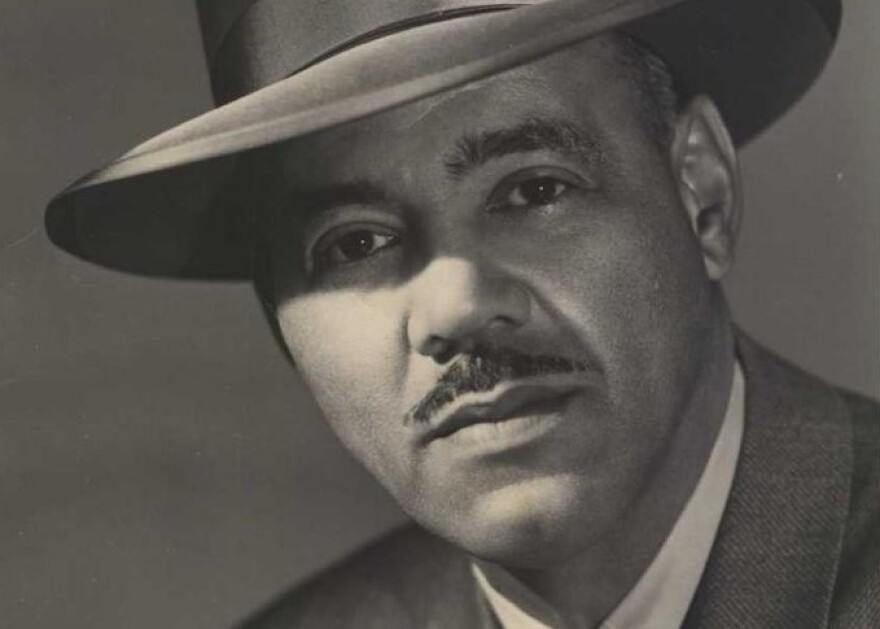He was murdered almost 50 years ago, so fewer Kansas Citians these days might know the name Leon Jordan. But he was one of Kansas City's most important civil rights leaders, and at one point his homicide was the Kansas City Police Department's oldest cold case.
Now, a new play is helping re-establish his legacy in the community.
The play is the second such collaboration involving Mike McGraw, a Pulitzer Prize-winning investigative reporter, and journalist-playwright Michelle Tyrene Johnson, who is also a former attorney. In 2016, their "Justice in the Embers" told the story of another legendary Kansas City crime in which new facts told a different story decades later.
Johnson joined KCUR as a reporter in late 2017; McGraw died in January of this year.
The way Johnson tells it, she needed a little convincing before thinking the circumstances of Jordan's death would make for a good play.
But McGraw was good at convincing people, and he went to work on Johnson.
"I think it's more accurate to say he badgered me into writing the play — over and over again," Johnson said. "Literally the first day I met Mick, he wanted me to write a play on Leon Jordan."

"He just felt that Leon Jordan was this really important part of Kansas City history that was not getting the attention and the shine that somebody of his stature and his influence should have," Johnson said in a conversation with Steve Kraske on KCUR's Up To Date.
Johnson, who finally relented, named the play after the bar Jordan owned on the corner of 26th Street and Prospect Avenue: the Green Duck Lounge.
Jordan had stature and influence to spare. In 1938, he joined the KCPD and was the department's first black lieutenant. He became a member of the NAACP in the 1950s, served as a Democratic committeeman for Kansas City's 14th Ward starting in 1958, and four years later he co-founded Freedom, Inc., the organization that held voter drives, raised political awareness among the African-American community and developed African-American political candidates. By 1964, Jordan had won a House seat in the Missouri General Assembly.
"His stretch and his impact was very far, and very deep," said veteran reporter Glenn Rice, who worked with McGraw to research and report Jordan's case for The Kansas City Star.
"Anyone who sought the vote of support from the African-American community," Rice said, "had to go through the Green Duck Lounge to speak with Leon Jordan."

Jordan's clout didn't go over well with everyone. He was gunned down outside the bar on July 15, 1970. Investigators interviewed hundreds of people, analyzed 112 sets of fingerprints and conducted 13 polygraph tests, according to the Star. But the case remained unsolved.
By the time McGraw and Rice heard about the story and began digging in, it was 40 years old. Because of their investigation, and at the strong urging of civil rights activist Alvin Sykes, the police reopened the case.
A year later, police released a 900-page report pinning blame on former Black Mafia leader James Dearborn, who was himself murdered in 1985. The case was closed again.
"Over the years, the ownership of the Green Duck changed very frequently," said Rice, who grew up on Agnes Avenue a few blocks east of the old tavern. "You still can go there and have that sense of those ghosts of those political pasts."
For Johnson, the past was rekindled in 2015 when James Townsend, then-owner of the Green Duck, was shot dead behind his home on the 2900 block of Prospect Avenue.
"Wow, I mean, the parallels of having these two owners of this really influential place be murdered," she said. "What does that say about how things have changed and how things have stayed the same, particularly in the black community?"
She went to work, and produced a play that's set to take stage February 21-25 at the Rhynsburger Theatre at the University of Missouri in Columbia.
Half the play is set in 2015, and half centers on Jordan in the 1960s. Actors play double duty, portraying characters from then and closer to now.
"It really underscores the parallels between the issues of civil rights for African-Americans," Johnson said.
The structure also encourages conversation about the proper way to push for civil rights, she said. Such conversations, she said, have been going on for generations, between and within different communities. She's gone so far as to include post-play discussion as the final component of "The Green Duck Lounge."

"There's always been black respectability politics ... where you have people go, 'Slow down, take it easy, let's not upset the white people," said Johnson. "And then there are the other segments of that population, usually younger, that are like, 'No, let's break it down, let's make some noise.'"
Creating a catalyst for those discussions, which Johnson said are vital, helped inspire the passion she needed to take her project to stage.
"It's the trick with any creative project," she said. "You just have to believe in the importance of doing it, even if you don't know exactly how you're going to do it."
Michelle Tyrene Johnson's 'The Green Duck Lounge' runs at the Rhynsburger Theatre on the University of Missouri campus in Columbia from February 21 to 25. For times and tickets, visit Theatre.Missouri.edu.
Listen to Steve Kraske's entire conversation with Michelle Tyrene Johnson and Glenn Rice here.
Luke X. Martin is associate producer of KCUR's Up To Date. Contact him at luke@kcur.org or on Twitter.




